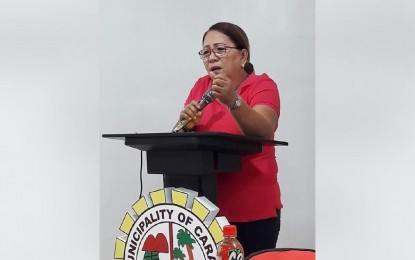
Mayor Alicia Mori of Caraga, Davao Oriental (Photo courtesy of LGU Caraga-PIO Facebook)
MANILA – The Office of the Ombudsman (OMB) has found Mayor Alicia Mori of Caraga, Davao Oriental guilty of simple neglect of duty.
The verdict stemmed from a Department of the Interior and Local Government (DILG) case against Mori for failure to comply with President Rodrigo Duterte’s directive to clear roads of illegal structures and obstructions.
DILG Secretary Eduardo Año welcomed the decision of the OMB against Mori.
“Walang lugar ang pagpapabaya sa tungkulin lalong-lalo na ngayon sa panahon ng pandemya. Nawa’y magsilbing babala ang desisyon ng Ombudsman sa iba pang lokal na opisyal na hindi sumusunod sa direktiba ng ating Pangulo (There is no room for dereliction of duty especially amid the pandemic. May the Ombudsman decision serve as a warning to other local officials who do not comply with the President’s orders),” he said in a news release.
According to the decision of Ombudsman Samuel Martirez dated March 10, 2021, Año said “the Ombudsman found Mori guilty of simple neglect of duty with the penalty of reprimand pursuant to Section 10 (b) of the Ombudsman Administrative Order No. 17, Series of 2003 with a stern warning that a repetition of the same act shall be dealt with more severely.”
Mori was found accountable for neglecting her duties as a local chief executive as evidenced by records that show that the local government unit (LGU) of Caraga, Davao Oriental lacked any ordinance on road clearing, one of the major indicators in the DILG compliance assessment.
Under Section 444 (b) 1 (iv) of Republic Act (RA) No. 7160 or the Local Government Code, a municipal mayor shall initiate and propose legislative measures to the Sangguniang Bayan and, from time to time as the situation may require, provide such information and data needed or requested by the Sanggunian in the performance of its legislative function.
According to Año, the Ombudsman’s decision noted that the proposed municipal ordinance prohibiting illegal obstructions was still on its second reading as of Nov. 20, 2019.
The OMB received Mori’s position paper on Feb. 18, 2021, without any clear indication that the said ordinance had been passed.
Moreover, records also revealed that Mori only conducted road clearing operations in her town in October 2019 as supported by photographs submitted.
The OMB further said that in administrative cases, the quantum proof required is substantial evidence, and the evidence of a failed rating of 45 out of 100 points on the LGU Compliance Assessment and proof of delayed compliance with the directives of the DILG Memorandum Circular (MC) 2019-121 clearly speaks for itself.
"Had the respondent been more attentive of her duties as the local chief executive, significant results or even full compliance would have been achieved within the period prescribed by the DILG MC," the Ombudsman decision said.
DILG MC No. 2019-121 enjoins all provincial governors, city and municipal mayors, "punong barangays" (village chairpersons), and heads of the local "sanggunian" (council) to exercise their powers to reclaim public roads from illegal structures and obstructions as directed by the President.
All LGUs were assessed based on the following indicators: enactment of an ordinance on the clearing of roads or banning of illegal obstructions; conduct of inventory of roads; conduct of road clearing operations to remove obstructions; planning and implementation of displacement strategies for those affected; rehabilitation of the declared roads, sidewalks and areas that were restored for public use; and presence of a grievance and feedback mechanism regarding the clearing of road obstructions. (PR)
